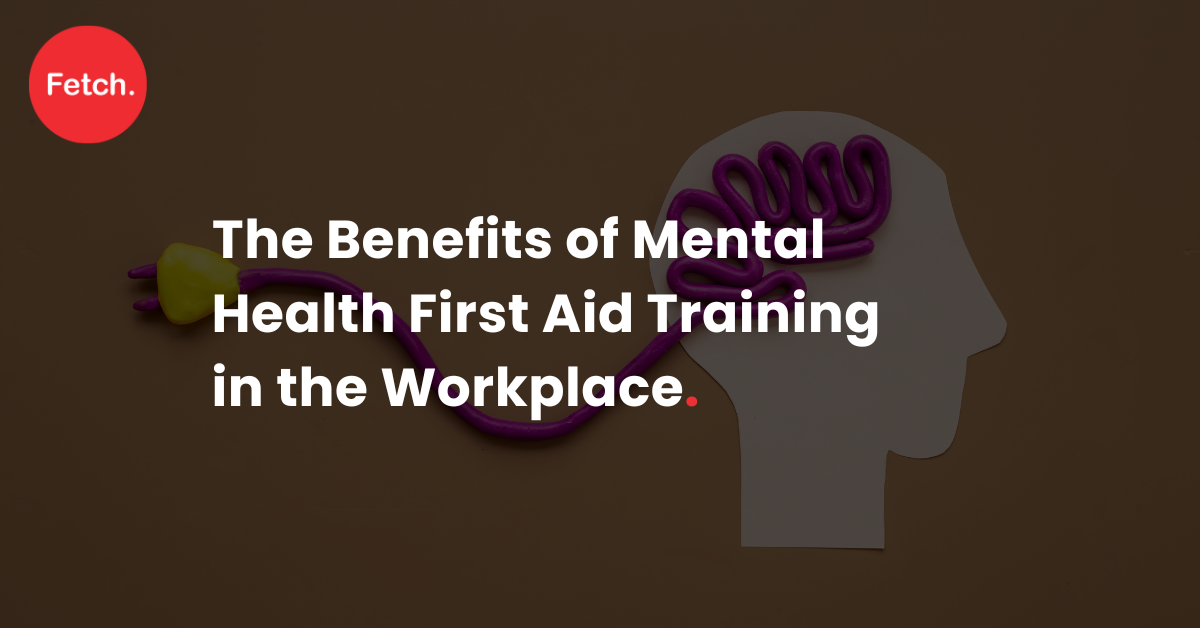The Benefits of Mental Health First Aid Training in the Workplace
As an employee or manager, it is likely you will encounter a colleague who is experiencing a mental health issue at some point in your life. It’s an issue my team members and I are all too familiar with, which has inspired us to take steps towards making a difference. As nearly half of all Australians will experience mental health issues during their lives, there are direct implications for employers. Research shows Australian businesses lose more than $6.5 billion each year by failing to provide early intervention or treatment for employees with mental health conditions.
As built environment recruitment specialists, we’ve observed how it can be especially difficult for employees in industries like construction and civil infrastructure to talk to someone when they’re struggling. Employees or colleagues don’t always feel comfortable approaching a senior team member or director about the mental health issues they may be experiencing. Let’s face it — that kind of conversation isn’t easy for most of us!
Why We’re Supporting Mental Health for Clients and Candidates
With these issues in mind, I was inspired to take practical steps towards tackling mental health challenges at work — for the sake of our clients, contractors, candidates and colleagues. Recruitment is first and foremost a people-oriented business, which places Fetch Recruitment in a primary position to be mental health ‘first responders’. It’s vital that our team have the right skills to provide the best possible support to the hundreds of contractors we manage across multiple projects.
So, how did we achieve this? By having the some of the Fetch Recruitment team complete their training to obtain a Mental Health First Aid (MHFA) certificate.
My goal was to ensure myself and some of my colleagues within the business are certified in MHFA and are equipped to help others when it’s needed. I’ll explain what first aid training for mental health involves, the surprising lessons we learned from it, and why it’s such a powerful step in supporting workplace health and wellbeing.
What does Mental Health First Aid Training Involve?
Mental Health First Aid (MHFA) is a similar concept to traditional first aid, which teaches people how to administer basic medical care in the event of a physical injury or medical emergency.
As a training program, MHFA is designed to teach individuals how to provide initial assistance and support to someone who may be experiencing a mental health crisis or struggling with a mental health issue.
The primary goals of Mental Health First Aid training are:
- Increase Awareness: To raise awareness about mental health issues in the workplace and reduce the stigma associated with them.
- Provide Knowledge: MHFA training equips individuals with the knowledge and skills to recognise the signs and symptoms of common mental health problems such as depression, anxiety, substance use disorders, and suicidal thoughts.
- Offer Initial Help: To give participants the ability to offer initial assistance to someone in crisis or who may be developing a mental health problem. This includes knowing how to listen non-judgmentally, offer support and encourage the person to seek professional help if needed.
- Promote Self-Help: To encourage self-help and self-care strategies for individuals struggling with mental health challenges.
- Guide to Appropriate Resources: To provide information about local mental health resources and services where individuals can seek further help and treatment.
What I Learned from MHFA Training
Myself and two of my colleagues completed MHFA training with accredited provider Mental Health First Aid Australia. Our training covered topics including understanding mental health and mental illness, substance abuse, recognising signs and symptoms, providing appropriate support and connecting people to professional help when necessary.
The whole experience was a genuine eye-opener that gave my colleagues and I a much broader perspective on dealing with mental health in the workplace.
Here are a few insights I’m grateful to have walked away with:
- Identifying warning signs and ‘tells’: The signs of mental health problems can be difficult to detect without knowing what to look for. The strongest signals are changes in a colleague’s behaviour and mood, along with a decrease in their productivity, frequent time off, withdrawal from social interactions and gatherings, and an unkempt appearance.
- How to be non-judgemental and listen: To give people the help they need, I had to learn about ensuring people are comfortable with talking to me about mental health. The key is to avoid trying to ‘diagnose’ or give advice to someone. MHFA is about learning to listen to people, without judgement or preconceptions.
- Avoiding any claims of expertise:Giving mental health first aid isn’t about being a hero or expert. It’s about knowing the ‘next steps’ and which resources I can connect an employee to when they need help. After someone has communicated their struggles and experiences to me, I can help them by showing them where to access professional help and resources.
- Understanding my limits:Another important lesson is understanding I won’t be able to solve everyone’s problems. MHFA is about giving people the immediate support they need, and knowing which questions to ask people who are in crisis. We must avoid the temptation to get personally invested in the individual’s issues.
Tips for How to Improve Mental Health at Work
If you’ve read this far and are wondering what you can do to improve mental health at work and help create a supportive environment for your colleagues, here are a few tips.
- Encourage teams to complete mental health first aid training: This ensures everyone has consistent knowledge and resources they can refer to when issues arise.
- Promote open communication:Encourage open and non-judgmental communication with your colleagues. Let them know that you are there to listen if they want to talk about their feelings or concerns. If they confide in you, do not share their personal information without their consent!
- Give a helping hand: If you notice a colleague is feeling overwhelmed, offer them assistance with workloads or tasks. Be willing to cover for colleagues when they need time off for self-care or medical appointments. And, remember to show empathy and understanding regarding their need to prioritise their well-being!
Final Thoughts
If you are dedicated to improving workplace health and wellbeing, Mental Health First Aid training is an investment worth making. The ability to respond effectively to mental health crises and promote early intervention will enable your teams to contribute to a more supportive and understanding society regarding mental health issues. As a company, we believe everyone in our industry should help raise awareness and reduce the stigma associated with mental illness.
If you’re interested in finding out more about mental health first aid training, please feel free to contact myself or the team today.
Additional Resources
If you or someone you know may need support, please consider sharing or reaching out to the following professionals and resources, as they are there to help:
Lifeline
📞 13 11 14
Beyond Blue
📞 1300 224 636
Mensline
📞 1300 789 978
Recent Blogs



